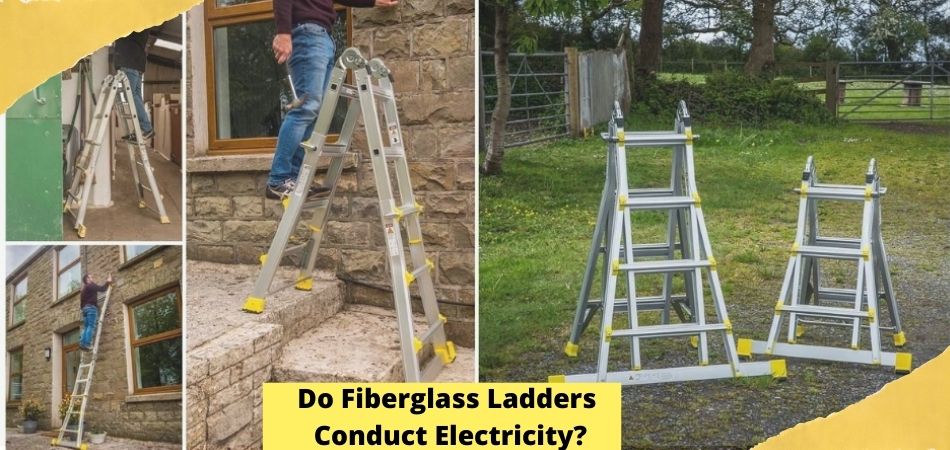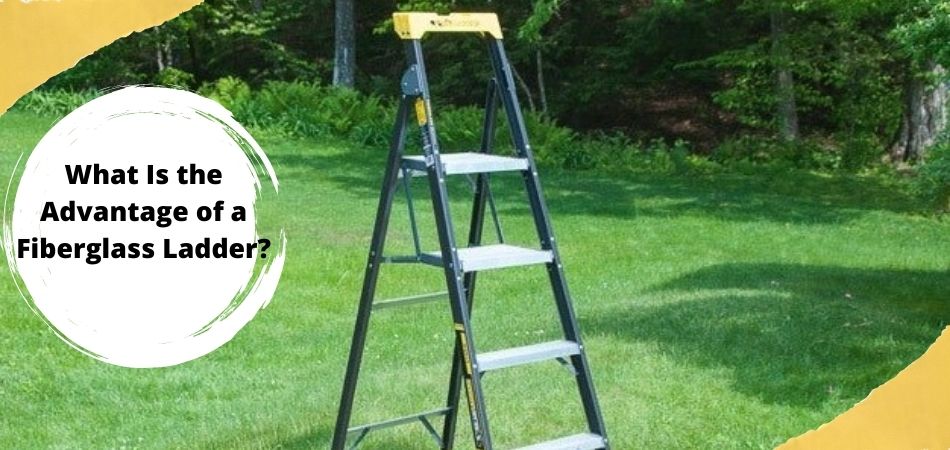Research of the Consumer Products Safety Commission showed, about 65,000 people get admitted into hospitals annually in the United States due to ladder accidents.
A large number of these accidents are related to electricity even after using fiberglass ladders. You may ask, what is the problem with these ladders? Do fiberglass ladders conduct electricity?
The answer is, No, Fiberglass ladders don’t conduct electricity. But there’s a catch here! This is why we will take you up the ladder to explain how good are fiberglass ladders for electrical work and can a fiberglass conduct electricity.
Let’s hop onto it and see what you can expect from a fiberglass ladder and what not.
What Type Of Ladders Conduct Electricity & What Types Do Not?
Whether you use a ladder for painting stairwell or roofing works, it can mostly be made of one of three materials, aluminum, wood, or fiberglass. Among them, fiberglass is the safest material to use when you are working with electricity.
This is because fiberglass is an insulator that prevents electricity from going through the ladder. Until a closed circuit isn’t made through the ladder, you are safe from electrocution.
It also happens in the case of wood ladders because Wood makes a good insulator as well. But the problem with the wood ladder is, it gets degraded too quickly. They also catch moisture from the environment and can sometimes be risky to leave outside.
Among these materials, aluminum is the riskiest material for ladders. An aluminum ladder is a very good conductor of electricity. As a result, if your ladder comes in contact with a live wire, it will make a close circuit to the ground, and chances are you will be electrocuted in the blink of your eyes.
So, if you are planning to work with electricity, it is best to avoid metal ladders to keep from any unwanted electrical hazards. Also, aluminum ladders tend to be softer and take less load than the other two types.
Taking a fiberglass extension ladder from a ladder manufacturer, like Louisville with a capacity of 300 lbs and length of 16 ft will handle most of your jobs effortlessly. You can also choose from a lot of other models they have to offer.
Do Fiberglass Ladders Conduct Electricity?
The main reason fiberglass ladders are so popular is their non-conductive characteristics. Though these ladders have aluminum rungs, you are completely free of risk while using such a ladder, especially when you’re using a certified ladder in a good condition.

But the big question here is, why do people get electric shock then while working on fiberglass ladders? Do fiberglass ladders conduct electricity when dry? Well, we are going to tell you about a few exceptions down the lane.
You may already know, electricity needs a closed circuit, a clear road to be simpler, to flow. Though fiberglass ladders have aluminum rungs, those rungs don’t make a closed circuit as they are held by fiberglass on both sides.
As a result, a certified fiberglass ladder will never conduct electricity. But what if the non-conductive characteristics of the ladder are damaged somehow? When you continue using these ladders, dirt and grease can accumulate on the crevices of ladders.
Continuing this for a long period might damage the polymer bond of fiberglass. Even if the ladder is exposed to high heat or certain chemicals, the outer coating of the ladder can face decay. When this decay reaches the core of fiberglass, fibers are exposed to the environment.
Dirt can contain different ionic compounds that will then make the ladder partially conductive. This is when the circuit will be closed if you catch live power lines. Result? You get an electric shock in no time.
In another case, fiberglass ladders can get wicked by moisture if fibers are exposed to nature. This happens due to the capillary process. When something like this happens, the ladder loses some of its non-conductivity and becomes a potential threat for you.
As a singer, Tatianna said in one of her songs, “Because what you see, isn’t always the truth”, you can see the same here too.
What Are The Advantages of Using Fiberglass Ladder?
Now that you know how to keep safe from accidents while using a fiberglass ladder, let’s see how can these ladders be advantageous to us over two other types.

- Fiberglass ladders are the strongest of all three types. This is a high tensile material that will give high durability to your ladder.
- Fiberglass doesn’t usually conduct electricity. It makes totally non-conductive ladders. So, you can safely use these ladders for electrical works.
- Storage is easy with fiberglass ladders as they are weather resistant. As a result, these ladders won’t catch moisture and the integrity of the ladder will sustain for a long time.
- Fiberglass ladders usually don’t bend which is common in wood and aluminum ladders.
- Fiberglass ladders can take more load compared to the other two types of ladders. The weight a ladder can tolerate depends on its rating. Commonly, a highly rated fiberglass ladder can take up to 300 lbs.
- As fiberglass ladders are heat resistant, you won’t feel uncomfortable even after working under the scorching heat. Also, fiberglass won’t expand under heat, so the safest ladders won’t bend easily.
- Fiberglass ladders are less prone to aging compared to wooden ladders.
The Bottom Line
Well, now you know whether do fiberglass ladders conduct electricity, or not! As you can see, fiberglass ladders don’t only offer high-strength support, but also keep you safe while doing electric jobs. And the other advantages of using a fiberglass ladder will surely get you by in job sites.
The knowledge you have obtained from here will come into play next time you go out to work with a fiberglass ladder. We hope this keeps you from all hazards during work. Please maintain all safety rules before you start working with electricity on a fiberglass ladder.